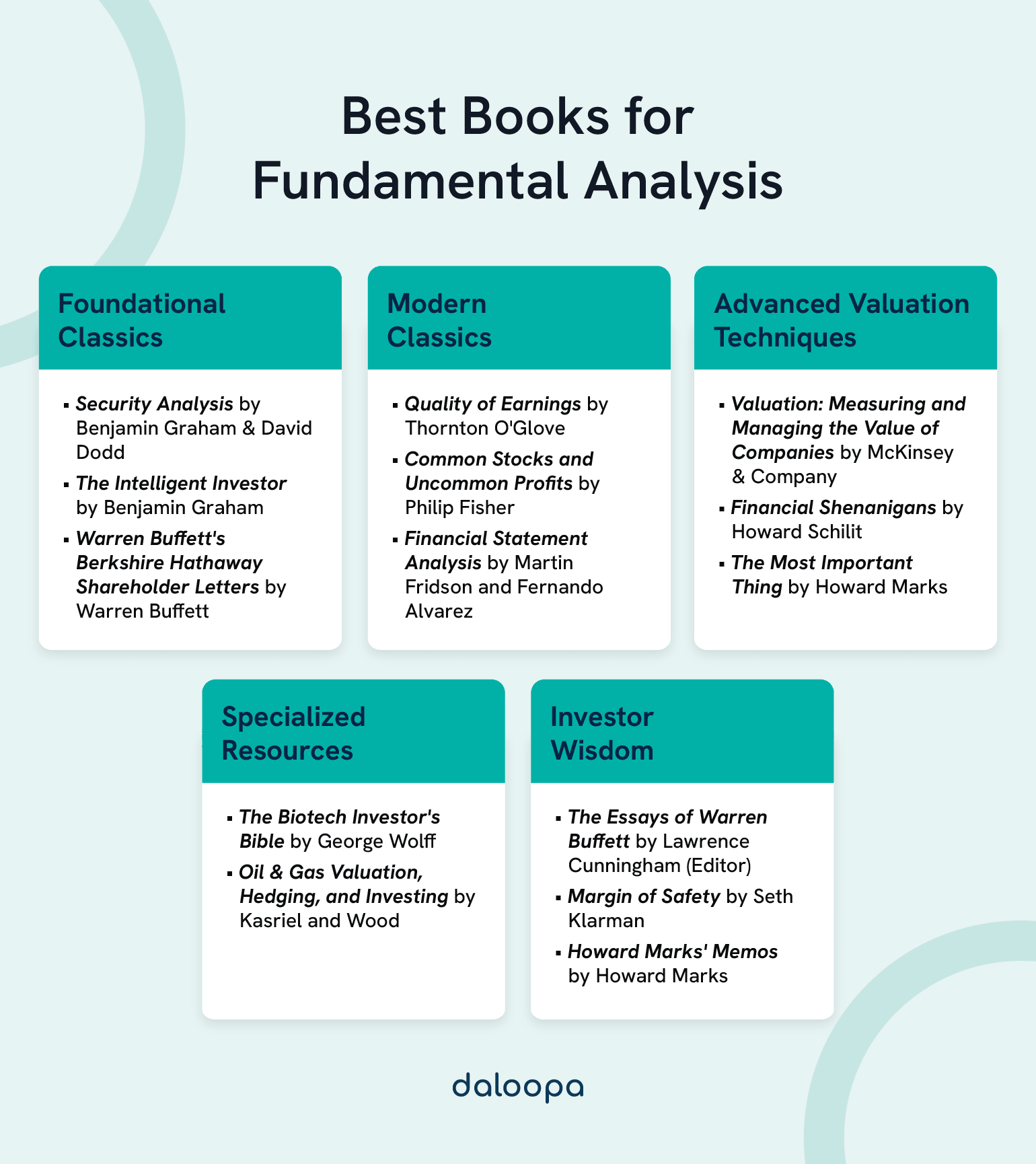Every investor fears making a mistake that costs them big, like buying into a hyped company only to watch it crash once the numbers come into focus. That’s exactly what fundamental analysis is designed to prevent. It’s how you separate a business with real staying power from one built on narrative alone. The best book for fundamental analysis can help you build a system of logic, patience, and smart risk-taking that works even in volatile markets.
Key Takeaways
- “Security Analysis” by Graham and Dodd still sets the gold standard for mastering fundamental analysis.
- The best books for fundamental analysis mix valuation tactics with deep dives into financial reports.
- Thoughtful investing replaces guesswork with clear systems and long-term thinking.

Finding the Best Book for Fundamental Analysis
You’re likely here because you’re overwhelmed by stock noise and want clarity. These books help you cut through hype and build your own investing framework. Think of them as your investing curriculum, one title at a time.
Foundational Classics That Shaped Modern Investing
Let’s start with the fundamentals—literally. These are the books that taught Warren Buffett and thousands of other investors how to think clearly about value, risk, and financial integrity. If you want the best book for fundamental analysis, these are the classics to consider.
If you want to build your own models or analyze financial statements with confidence, start here before jumping into Excel.
- Security Analysis by Benjamin Graham and David Dodd: The gold standard for fundamental analysis, first published in 1934. This 700-page classic teaches you how to evaluate intrinsic value, analyze balance sheets, analyze financial statements and understand why buying undervalued companies leads to consistent returns. This is the best book for fundamental analysis if you are comfortable with financial statements and serious about deep, careful investing.
- The Intelligent Investor by Benjamin Graham: Think of this as “Security Analysis Lite.” It focuses on behavioral principles like the margin of safety and “Mr. Market,” a metaphor that helps you resist hype and panic. Buffett has called this “by far the best book on investing ever written.” It’s the best book for fundamental analysis that’s accessible to both beginners and experienced investors.
- Warren Buffett’s Berkshire Hathaway Shareholder Letters: These aren’t books, but they might as well be. Read them to see how a master investor applies fundamental analysis for beginners, in the real world.
Modern Classics For Contemporary Investors
These books bring the principles of fundamental analysis into today’s market, teaching you how to identify earnings manipulation, spot quality management, and go beyond just the numbers.
- Quality of Earnings by Thornton O’Glove: If you’ve ever worried about being duped by a company’s press release, read this. O’Glove shows how subtle accounting tricks—like shifting expenses or booking revenue early—can hide trouble. His case studies are still relevant, even in today’s era of AI-generated earnings summaries.
- Common Stocks and Uncommon Profits by Philip Fisher: Where Graham is quantitative, Fisher is qualitative. He introduced the idea of “scuttlebutt”—getting information about companies by talking to employees, suppliers, and customers. This book is invaluable for evaluating intangible assets like leadership quality and company culture.
- Financial Statement Analysis by Martin Fridson and Fernando Alvarez: Less philosophical, more hands-on. This is a practical, textbook-style guide to dissecting income statements, balance sheets, and cash flow. Real-world examples help translate dry numbers into clear insight. If you want to build your own models, start here before jumping into Excel.
Advanced Valuation Techniques
Once you’re comfortable reading financials, you’ll want to move from descriptive to predictive thinking. These books help you refine valuation models, analyze management assumptions, and avoid being fooled by surface-level data.
- Valuation: Measuring and Managing the Value of Companies by McKinsey & Company: This is the textbook used in MBA programs and investment banks. It covers discounted cash flow (DCF) models in granular detail—perfect if you’re ready to move beyond stock screeners and build serious valuation frameworks.
- Financial Shenanigans by Howard Schilit: Think of this as a lie detector for public companies. Schilit walks through historical examples of accounting fraud and aggressive bookkeeping to teach you what red flags to look for. Start here if you want to build your own models or analyze financial statements with confidence.
- The Most Important Thing by Howard Marks: Less about numbers, more about mindset. Marks explores how great investors think probabilistically, remain calm under pressure, and make decisions when everyone else is panicking. A must-read for internalizing risk-reward thinking.
Specialized Resources For Deeper Understanding
If you’re investing in specific industries or just want to go further than the average retail investor, these resources help sharpen your edge.
Industry-Specific Analysis Guides
Sector nuances can make or break an investment. These books break down the metrics and models unique to specific industries:
- The Biotech Investor’s Bible by George Wolff: Perfect for anyone considering pre-revenue biotech plays. It explains the FDA approval pipeline, drug trial stages, and how to value intellectual property, critical for navigating volatile names with high upside and risk.
- Oil & Gas Valuation, Hedging, and Investing by Kasriel and Wood: Energy stocks play by different rules. This book unpacks reserve accounting, commodity pricing, and asset retirement obligations. Great for analyzing upstream/downstream business models.
You can also dive into CFA Institute’s sector primers, which offer professional insights on banking, telecom, and healthcare valuation techniques—ideal if you’re applying for a finance role or managing sector-specific exposure.
Investor Wisdom From Market Masters
Great investors don’t just follow formulas—they develop philosophies. These books help you learn from some of the best minds in the business.
- The Essays of Warren Buffett, edited by Lawrence Cunningham: If you want a condensed, thematic version of Buffett’s letters, this book organizes them into digestible chapters. It’s a bridge between theory and application.
- Margin of Safety by Seth Klarman: Rare and expensive in print, but PDF copies float around online. Klarman outlines how to avoid permanent capital loss by focusing on downside protection. His emphasis on patience and discipline makes this a core read for contrarians.
- Howard Marks’ Memos: Available free via Oaktree Capital’s website, these memos cover cycles, market bubbles, and the dangers of consensus thinking. His essay on risk (“Risk Revisited”) is a particularly eye-opening read.
Application And Practice Resources
Reading is step one. Practicing is step two. These resources help you go from “I understand it” to “I built this model myself.”
- Wall Street Prep and Breaking Into Wall Street: These platforms offer Excel-based training with real-world case studies. You’ll learn how to build DCF models, LBOs, and comps from scratch. Ideal for aspiring analysts or serious retail investors who want institutional-level skill sets. Some packages include sector-specific walkthroughs and access to practice interviews.
- FinViz and Stock Rover: Use these free screeners to filter stocks by fundamentals like P/E, ROE, or debt-to-equity. You can even backtest strategies or compare company fundamentals over time, powerful tools for those applying fundamental analysis for beginners or refining stock-picking skills..
- The SEC’s EDGAR Database: Free, searchable, and packed with real financials. Want to try it? Head to sec.gov, pull up Apple’s 10-K, and search for “Risk Factors” or “Operating Leases.”
Ready to Build Your Own Playbook?
Fundamental analysis is not just for hedge fund pros or MBAs. With the right materials, consistent practice, and a healthy skepticism toward hype, you can analyze stocks with the same confidence as seasoned investors. These books and tools will help you stop making expensive mistakes and start thinking clearly about where your capital should go.
Daloopa helps analysts and serious investors automate the drudgery of fundamental analysis—turning SEC filings into clean, usable data you can trust. If you’re tired of copy-pasting from PDFs or triple-checking formulas, get in touch with us and let our AI-powered system do the heavy lifting. Whether you’re a seasoned professional or just starting out with fundamental analysis, our resources will help you build a complete, repeatable process.



